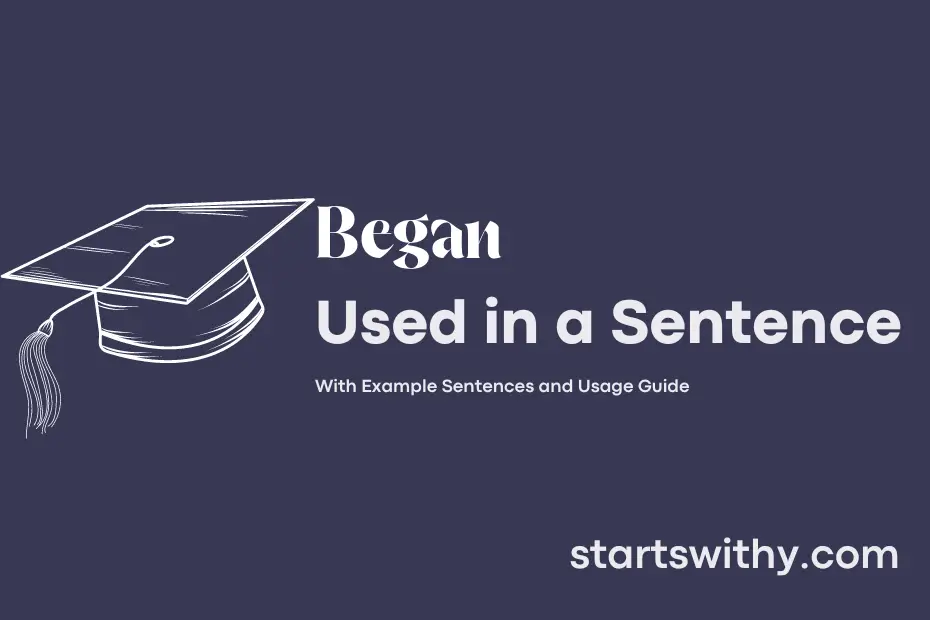Have you ever wondered how to use the word “began” correctly in a sentence? In its simplest form, “began” is the past tense of the verb “begin,” indicating the start or initiation of an action or process.
When crafting a sentence with “began,” it typically marks the point in time where an event, activity, or state commenced. It adds a sense of movement or change, showing the transition from not doing something to starting to do it.
7 Examples Of Began Used In a Sentence For Kids
- The race began as soon as the teacher said go.
- We all began dancing when we heard the music.
- The story began with once upon a time.
- The rain began falling as we played outside.
- The movie began right on time.
- We all began clapping after the performance.
- The cake cutting began with a countdown.
14 Sentences with Began Examples
- As the semester _began_, students hurried to buy textbooks and stationery.
- The lecture hall fell silent as the professor _began_ the class with an inspiring quote.
- Amidst the chaos of moving into their new dorm rooms, the roommates _began_ bonding over shared interests.
- The student club fair _began_ on campus, attracting a large crowd of eager participants.
- As the sun set, the study group in the library _began_ reviewing for their upcoming exams.
- The sports trials _began_ as athletes showcased their skills and determination.
- In the computer lab, the coding competition _began_ with participants eager to demonstrate their programming abilities.
- The internship fair _began_, offering students the opportunity to explore potential career paths.
- The annual college festival _began_ with music blaring and students dancing in celebration.
- The guest lecture series _began_ with a renowned speaker sharing insights into industry trends.
- During the workshop on time management, students _began_ to prioritize their tasks and create schedules.
- The volunteering initiative _began_ with students signing up to make a positive impact in their community.
- As the debate competition _began_, participants eagerly presented their arguments on various topics.
- The career counseling sessions _began_, guiding students in making informed decisions about their future.
How To Use Began in Sentences?
To use Began in a sentence, follow these steps:
-
Identify the action: Begin is a verb that denotes the starting point of an action or process. Before using Began in a sentence, determine the action that is being initiated.
-
Subject-Verb Agreement: Ensure that the form of the verb Began matches the subject of the sentence. For example, “She began her homework” is correct, while “She began their homework” is incorrect.
-
Specify Time: To provide clarity about when the action started, consider including a time frame in the sentence. For instance, “He began painting yesterday” specifies that the painting started the day before.
-
Use in Simple Past Tense: Since Began is the simple past tense form of “to begin,” use it when referring to actions that started and ended in the past. For example, “They began the project last week.”
-
Avoid Redundancy: Try not to use Began along with other past tense verbs in the same sentence as it might lead to redundancy. Instead of saying, “She began and finished her meal,” say, “She began her meal and finished it.”
-
Practice: The best way to become comfortable with using Began in sentences is through practice. Try constructing various sentences using Began to reinforce your understanding of its usage.
By following these steps and practicing regularly, you can effectively incorporate Began into your sentences with confidence and accuracy.
Conclusion
In summary, the examples of sentences provided above showcase the versatility and importance of using varied sentence structures in writing. By incorporating sentences that started with “began,” a sense of action and progression is conveyed, adding momentum and clarity to the text. This keyword serves as a powerful tool for initiating a thought or introducing a new idea within a sentence.
Overall, the sentences featuring “began” demonstrate how this word can signal the start of an event, process, or narrative, effectively guiding the reader through the development of ideas. Utilizing such diverse sentence beginnings can enhance the flow and engagement of the writing, making it more dynamic and impactful.



